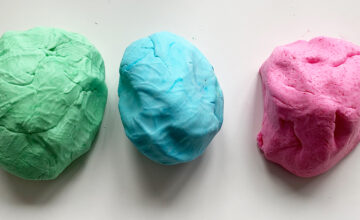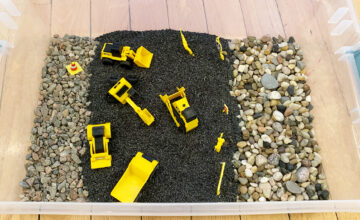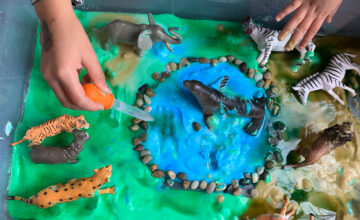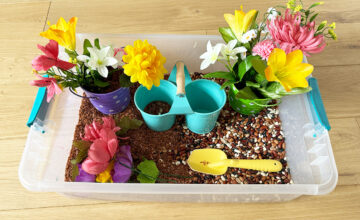
Creating a sensory bin inspired by the beloved story of The Very Hungry Caterpillar is not just a fun activity; it’s a fantastic way to combine play, learning, and creativity. This project is perfect for engaging little ones in a tactile adventure while celebrating the beauty of this classic tale. The twist? We’re making our sensory play even more vibrant with homemade colored pasta. Not only is this activity a hit with the kids, but it’s also a great way for parents and educators to introduce themes of growth, change, and nutrition in an interactive way.
Activity Overview
- Age Suitability: This sensory bin is good for toddlers aged children 2 years old and up with adult assistance.
- Mess Level: The mess level for this craft is medium.
- Difficulty to Create: Low.

Materials Needed
- Dried pasta (any shape)
- Green food coloring or liquid watercolor
- White vinegar
- Ziplock bag
- Tray and parchment paper or wax paper
- A tin can
- Red, green, and yellow construction paper
- Pretend food (fruits, veggies, etc.)
- Tongs or scooper
- Sensory bin
- Masking tape
Step by Step Instructions
1. Dyeing the Pasta: Begin by creating your green pasta, perfect for mimicking the caterpillar’s environment. Combine 2 tablespoons of white vinegar and several drops of green food coloring or liquid watercolor in a ziplock bag. Add the dried pasta, seal the bag, and shake until the pasta is evenly coated. Spread the pasta out on a tray lined with parchment or wax paper to dry. For a detailed guide on dyeing pasta, please visit this link.




2. Crafting The Very Hungry Caterpillar: To bring our caterpillar to life, trace a tin can on red construction paper to form the mouth of the caterpillar. Cut out a large circle for the face or head, then fashion two large yellow ovals and two slightly smaller green ovals for the eyes. Glue these pieces together and attach them to the head. Don’t forget to cut out and add the green antennae! Finally, secure the caterpillar head to the tin can using masking tape.





3. Setting Up the Sensory Bin: Fill your sensory bin with the green pasta. Add pretend food items around the bin to encourage imaginative play and interaction with The Very Hungry Caterpillar theme. Place the caterpillar can in the bin, along with tongs or a scooper for hands-on fun.




How They Played
Watching my kids dive into this activity was a joy. They used the tongs to pick up pasta and pretend food, mimicking the caterpillar’s journey through various foods. This simple setup sparked conversations about colors, counting, and the life cycle of a butterfly. The tactile experience of handling the pasta and the imaginative play around the caterpillar’s story kept them engaged and curious.
Tips for Success: If you opt for spiral pasta, you might find that you need a bit more coloring and vinegar to thoroughly coat the inner parts. Ensure the pasta is fully dry before introducing it to the sensory bin to avoid any messes.
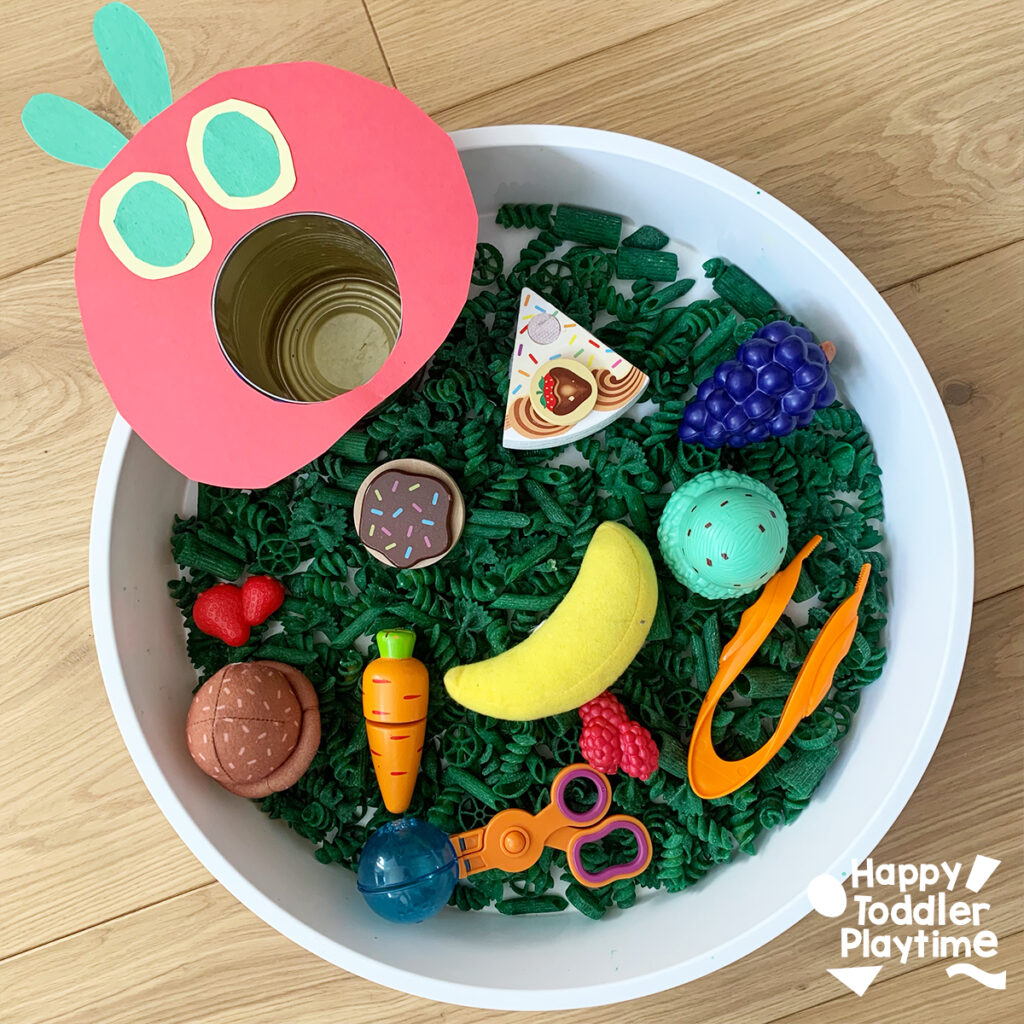
Skills Learned
- Fine Motor Skills: Manipulating the pasta and food items with tongs or fingers helps develop dexterity.
- Color Recognition and Sorting: Identifying and organizing the pasta and food by color enhances cognitive skills.
- Imaginative Play: Acting out the story fosters creativity and storytelling abilities.
- Sensory Exploration: The tactile experience of handling different textures supports sensory development.
This The Very Hungry Caterpillar sensory bin is more than just a playful homage to a classic story; it’s a comprehensive learning activity that entertains as it educates. Dive into this delightful project and watch as your little ones explore, learn, and grow in a world of colors and textures.
Play2Learn Toddler & Preschool Programs for Curious Toddlers
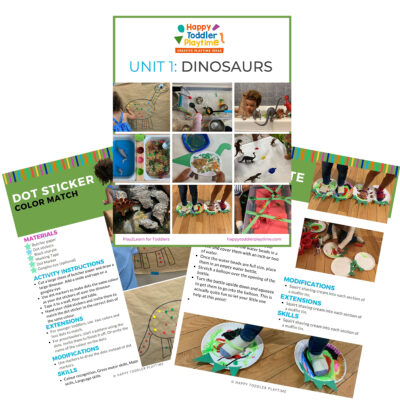
There is no limit to your toddler’s energy and curiosity. That energy and curiosity although a joy can be challenging at times. Their interest in just about everything around them is what makes them great learners. One and two year olds can soak up so much just from their senses!
But as a teacher or parent that thirst for learning can be exhausting. That is why I created this toddler and preschooler program. To help you get the most out of this time with your curious toddler without having to come up with creative ways to play and interact with them.
Play2Learn for Toddlers includes 20 Units for toddlers. Each 2-week toddler unit has 20 super easy to set up and engaging activities for toddlers 18 months to 3 years.
Play2Learn Preschool which includes 20 Units for preschoolers. Each 2-week preschoolers unit has 20 unique and easy to set up and engaging activities for preschoolers 3 years to 5 years. That’s over 800 learning activities for your toddler and preschooler at your fingertips! So many ideas you and your child will never be bored again!
These toddler and preschool lesson plans and activities will definitely keep you and your toddler and preschooler busy playing and learning!
Click here for more information: Play2Learn
Book: Exciting Sensory Bins for Curious Kids
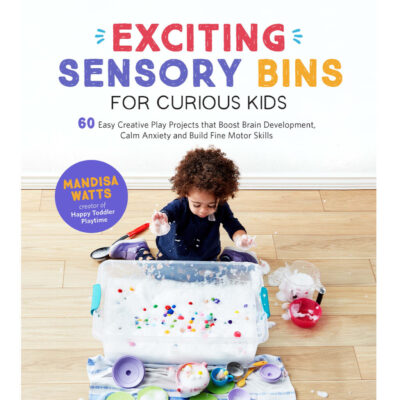
Did you know I wrote a book of sensory bins? Click here for more information Exciting Sensory Bin for Curious Kids. Or grab your copy at Amazon.
Boring afternoons are made exciting with awesome animal-based bins, like Salty Shark Bay or Yarn Farm. Pretend play bins like Birthday Cake Sensory Play or Bubble Tea Party encourage creativity and imagination. And your kids will have so much fun they won’t even know they’re getting smarter with STEAM (science, technology, engineering, art and math) activities like Sink or Float Soup, Magnetic Letter Hunt or Ice Cream Scoop and Count.
Designed for toddlers 18 months and up.
Book: Super STEAM Activity Book for Kids
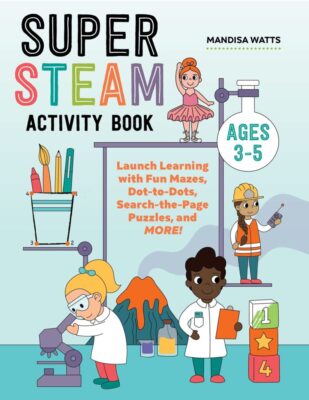
Learning all about science, technology, engineering, art, and math sets kids up for scholastic success―and it can be so much fun! Watch kids enjoy building STEAM skills as they color friendly fish, help water find its way to tree roots, solve math problems with mazes, and more.
Find out more and grab your copy here.
Designed for preschoolers 3 years old and up.
Book: Big Book of Riddles for Kids
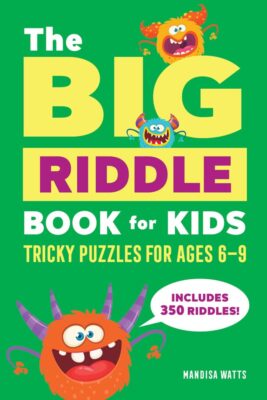
Riddle me this: What’s an exciting way to practice critical thinking while having a blast? The Big Riddle Book for Kids, of course! From hilarious puns to tough brain teasers, kids can build problem-solving skills with hundreds of riddles tha. t show them how to think outside the box.
- 350 riddles for kids—Have hours of fun with riddles, puns and jokes, and math and logic puzzles that’ll get their wheels turning!
- Level up their skills—Riddles get trickier as kids progress through the book, challenging them as they get better at solving puzzles!
- Double-check their work—Kids can check their answers in the back of the book with a handy answer key.
Help children expand their minds while having fun with this puzzle book for kids!
Designed for kids ages 6 years old and up.
TV Show: Curious Crafting
I’m so excited to share my crafting TV show Curious Crafting which launched in July 2022 on TVOkids and TVOkids YouTube! Season 2 aired in August 2023! My show was also nominated in 2023 for Best Live Action Preschool Series by the Youth Media Alliance Awards of Excellence.
Curious Crafting Season 1 is also now airing in Australia on ABC! Watch it here!
Set in the ultimate crafting space, Curious Crafting is a short form pre-school age series about the joy of making crafts. I lead a rotating cast of adorable little preschoolers (including my own) making magic out of common household objects.
In each episode we transform recycled items into magical crafts like a milk carton school bus, paper bag puppet or cotton pad turtle. The crafters learn and laugh their way through each activity while demonstrating what their young imaginations can create.
Curious Crafting shares the adventure and joy of making art with takeaway lessons for creating crafts at home.
This show designed for toddlers and preschoolers 2.5 years old and up.

The Very Hungry Caterpillar Sensory Bin
Materials
- Dried pasta (any shape)
- Green food coloring or liquid watercolor
- White vinegar
- Ziplock bag
- Tray and parchment paper or wax paper
- A tin can
- Red, green, and yellow construction paper
- Pretend food (fruits, veggies, etc.)
- Tongs or scooper
- Sensory bin
- Masking tape
Instructions
- Dyeing the Pasta: Begin by creating your green pasta, perfect for mimicking the caterpillar's environment. Combine 2 tablespoons of white vinegar and several drops of green food coloring or liquid watercolor in a ziplock bag. Add the dried pasta, seal the bag, and shake until the pasta is evenly coated. Spread the pasta out on a tray lined with parchment or wax paper to dry. For a detailed guide on dyeing pasta, please visit this link.
- 2. Crafting The Very Hungry Caterpillar: To bring our caterpillar to life, trace a tin can on red construction paper to form the mouth of the caterpillar. Cut out a large circle for the face or head, then fashion two large yellow ovals and two slightly smaller green ovals for the eyes. Glue these pieces together and attach them to the head. Don't forget to cut out and add the green antennae! Finally, secure the caterpillar head to the tin can using masking tape.
- 3. Setting Up the Sensory Bin: Fill your sensory bin with the green pasta. Add pretend food items around the bin to encourage imaginative play and interaction with The Very Hungry Caterpillar theme. Place the caterpillar can in the bin, along with tongs or a scooper for hands-on fun.


